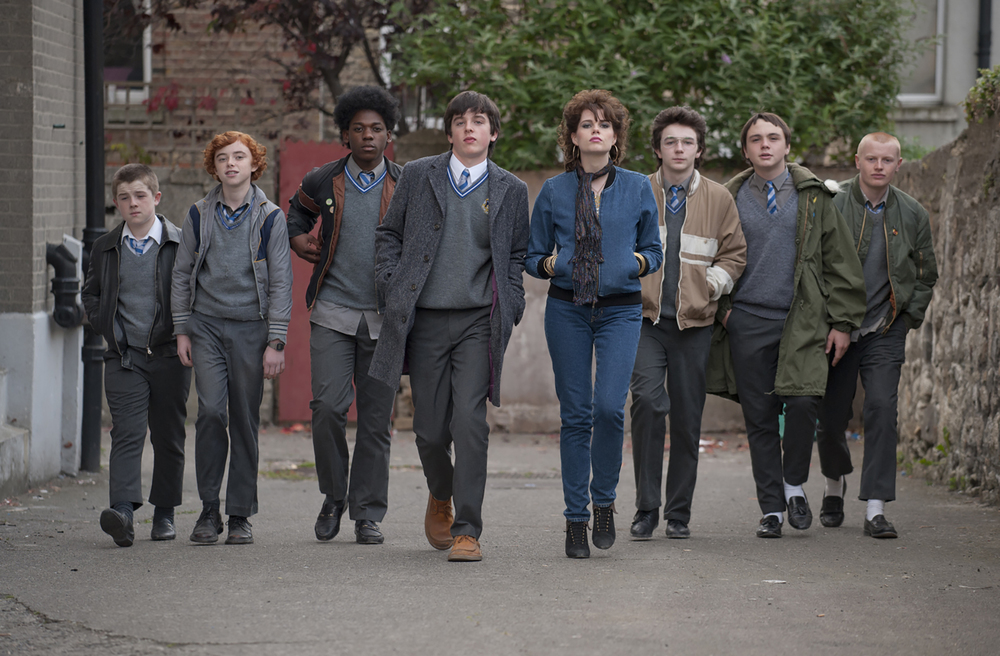John Carney forever changed the musical game with Once. Taking a naturalistic approach, a musical didn’t just have to be a lavish song and dance dream sequence engine, it could fit into a real story. After copying Once’s story for America, Carney returns home to Ireland to capture the magic of becoming a high school rock star. Sing Street taps Carney’s endless well of musical magic, this time with New Wave. And makeup. Endless, androgynous makeup.
Ireland during the 80s experienced lots of job loss, forcing tough decisions for many families. In one of those families, Robert (Aidan Gillen) and Penny (Maria Doyle Kennedy) cut their kids education. Cosmo (Ferdia Walsh-Peelo) leaves private school for a public one, and older brother Brendan (Jack Reynor) quits uni entirely. Cosmo’s school sucks until the day he Raphina (Lucy Boynton), whom he tries to impress by asking her to shoot a music video with her band. Realizing he needs a band before he can create a video, Cosmo recruits a hodgepodge of friends to play and write music with him. These guys, Raphina, and the boy’s family help Cosmo grow and evolve as a song writer, and a person, good enough that he might consider a trip to the dreamland, London.
Carney’s music has always elevated his films, using a song’s natural expressiveness to convey heart on sleeve emotion. While the magic is not as strong as Once, Sing Street’s music might be the best example of Carney’s understanding of gradations in the music industry. The New Wave movement on its surface sounds the same; however, Cosmo changes his style based on the different moods and styles of the bands. In Sing Street, the styles changes show an ever changing understanding of Cosmo’s world around him. We see Cosmo’s musical endeavors evolve and become emotionally complex and resonant as the day for the band’s big gig at the high school prom approaches. What started with a love song crush grew into a soundtrack of life experiences, which prepared Cosmo for the world he faces today. Such nuance is something only Carney can do, and to do it in a seemingly homogenous genre is even more impressive.
With the effort Carney puts into his songs, his screenplays tend to be plotwise straightforward, but emotionally complex. Sing Street is not the strongest emotional story Carney has ever told, but it gets the job done solidly. Cosmo’s arc is mentioned in the film to be sort of heroic, but Sing Street showcases the heroism with little actions, like knowing to stand up for himself without resorting to speeches or fighting, which isn’t his style. Brendan and (especially) Raphina get the more interesting arcs. Brendan’s is fascinating, playing the brother who simultaneously nutures/is frustrated by his brother’s success on Brendan’s path. Raphina’s story relies on dropped in devastating plot devices; her character is more an idea than a fully realized person.
Carney has worked well with Irish unkowns, and Sing Street follows that trend. Newcomer Ferdia Walsh-Peelo has to play the 80s everyman musician, and mostly comes across as sweet and likeable, his primary job. Jack Reynor nails all the good stuff as Brendan, navigating the funny and serious equally well. Lucy Boynton makes Raphina her own, despite being disserviced by the screenplay; her acting choices made the character more interesting. Aiden Gillen (the “name” in the cast) and Maria Doyle Kennedy get some funny stuff but exist on the periphery. Cosmo’s band mates mostly get individualized characters, particularly good are Mark McKenna as Cosmo’s rabbit loving writing partner and Ben Carolan as the ginger manager.
Sing Street feels like Carney’s ode to his own past. However, anyone can find something to remember fondly here, whether it be music debates with family/friends, New Wave music, forming a band, or fawning over a crush. Also, more warily, Catholic kids may shudder at the horrors within the disciplinary driven education system in Ireland. Seriously, did any poor Catholic child enjoy their school experience?

